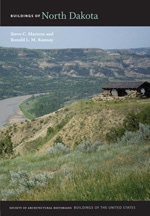William Drew Washburn, the first president of the Soo Line, purchased one hundred and fifteen thousand acres of land from the Northern Pacific Railway north of Bismarck and east of the Missouri River, where he established the Bismarck, Washburn and Great Falls Railway to make his land holdings more profitable. He later erected a wooden depot alongside the railroad tracks in Wilton, with hopes of making it the headquarters for his mining and land sale operations. The building features a distinctive pagoda-like tower, which is perhaps reminiscent of Washburn’s travels and his exposure to East Asian architectural motifs. The independent short line was acquired by the Soo in 1904 and the depot served Wilton until 1970, when the line ceased operations. Today this building stands as the only physical reminder of Washburn’s railroad endeavor.
You are here
Soo Line Railroad Passenger Depot
If SAH Archipedia has been useful to you, please consider supporting it.
SAH Archipedia tells the story of the United States through its buildings, landscapes, and cities. This freely available resource empowers the public with authoritative knowledge that deepens their understanding and appreciation of the built environment. But the Society of Architectural Historians, which created SAH Archipedia with University of Virginia Press, needs your support to maintain the high-caliber research, writing, photography, cartography, editing, design, and programming that make SAH Archipedia a trusted online resource available to all who value the history of place, heritage tourism, and learning.







